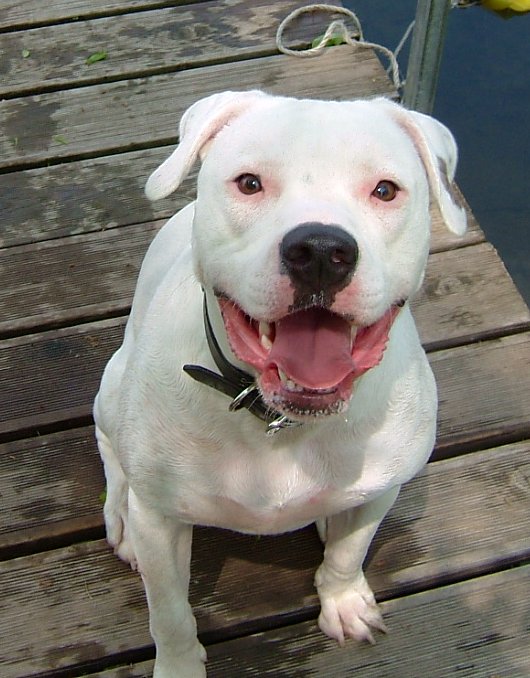American bulldogs
are not as prone to health problems as English bulldogs because American
bulldogs have longer muzzles and legs. However, American bulldogs are prone to
health conditions such as hip dysplasia, atopy and demodex mange, notes Sheldon
L. Gerstenfeld, VMD, author of ASPCA
Complete Guide to Dogs (Chronicle Books; 1999.)
Dogchannel.com
notes that many American Bulldogs have sensitive skin, but washing with a
gentle baby shampoo can help keep the skin from getting itchy. Some dogs
will have different colored eyes, but this usually does not denote poor health
such as deafness or vision problems.
Hip Dysplasia
Although there is still a lot unknown about hip dysplasia, it seems diet plays a big role in whether an American bulldog develops it or not. American bulldogs normally have voracious appetites. This can lead to obesity and filling up on the canine equivalent of junk food instead of nutritious food. Some breeders and owners swear by a raw diet, but many vets frown on raw diets. A dog needs a high quality protein and a low fat diet to help maintain weight and stay healthy.
Atopy
Atopy is the short name for atopic dermatitis or allergic
inhalant dermatitis. This is a genetic skin condition seen in a wide variety of
breeds and not just the American bulldog. Dogs with
atopy are super-allergic to some material such as feathers, house dust, ragweed
or pollen. Symptoms include intensely itchy skin, hair loss due to scratching,
swellings and sneezing. Dogs, no matter what breed, usually develop atopy
before they are three years old.
This is a frustrating but treatable condition, as long as
the allergen can be identified. Treatment includes removing the allergen (if
possible), allergy shots, oral allergy tablets such as antihistamines to reduce
swelling and possibly antibiotics if the dog has scratched or licked the skin
open. Affected dogs may need topical creams to stop itching and an Elizabethan
collar to stop scratching. Use the gentlest shampoos recommended by a vet.
Demodex
Mange
Also called demodectic mange or red mange, this is a type of mange
caused by the Demodex family of mites. Unlike sarcoptic mange, demodex mange is
not contagious. Demodex mites live inside of individual hair follicles. Adult dogs
tend to have immunity to demodex mites, so over half of canines with demodex
mange are puppies. But if an adult American bulldog has a chronic health problem,
this could lower the dog’s natural resistance to the mites.
Most cases can be managed through anti-parasite
medications like Ivermectin; medicated dips and diet changes. The younger the
dog, the higher the chances are for a complete recovery. If a dog or puppy does
get a relapse, it occurs within 6 to 12 months of the first infection, notes
Mar Vista Animal Medical Center.
Additional
References
- Dog Owner's Home Veterinary Handbook, Fourth Edition. Debra M. Eldredge, DVM, et al. Howell Book House; 2007.
- American Bulldog Rescue
- American Bulldog Association

No comments:
Post a Comment